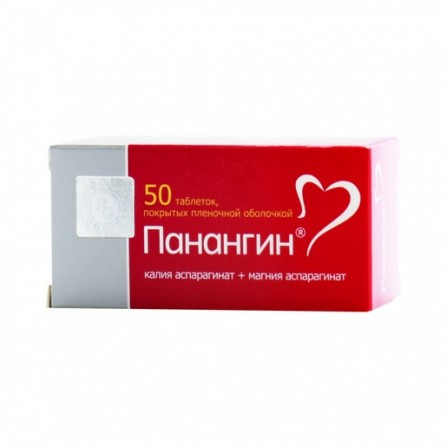More info
Active ingredients
Potassium and magnesium asparaginate
Release form
Pills
Composition
Potassium asparaginate hemihydrate is 166.3 mg, which corresponds to the potassium content of asparaginate 158 mg magnesium asparaginate tetrahydrate 175 mg, which corresponds to the content of magnesium asparaginate 140 mg adjuvants: colloidal silicon dioxide - 2 mg, povidone k30 - 3.3 mg, magnesium stearate - 4 mg, talc - 10 mg , corn starch - 86.1 mg, potato starch - 3.3 mg of the shell: macrogol 6000 - 1.4 mg, titanium dioxide (e171) - 5.3 mg, butyl methacrylate, dimethylaminoethyl methacrylate and methacrylate copolymer [1: 2: 1] - 6 mg, talc - 7.3 mg.
Indications
- as part of complex treatment of heart failure, acute myocardial infarction, cardiac arrhythmias (mainly ventricular arrhythmias, as well as arrhythmias caused by overdose of cardiac glycosides); - to improve the tolerability of cardiac glycosides; - replenishment of potassium and magnesium deficiency while reducing their content in the diet (for pills).
Contraindications
For ingestion - acute and chronic renal failure; - hyperkalemia; - hypermagnesium; - Addison's disease; - AV-blockade of grade I-III; amino acids; - hemolysis; - acute metabolic acidosis; - dehydration of the body. With caution: during pregnancy (especially in the first trimester) and during lactation. Addison; - AV-blockade of II-III degree; - cardiogenic shock (BP <90 mm Hg); - severe Myasthenia gravis; - dehydration; - adrenal cortex insufficiency; - age under 18 years old (efficacy and safety not established); - pregnancy; - lactation period; liver function, metabolic acidosis, the risk of edema, impaired renal function if regular monitoring of the serum magnesium content is impossible (risk of cumulation, toxic magnesium content), hypophosphatemia, urolithiasis diathesis associated with metabolic calcium, magnesium and ammonium phosphate.
Precautionary measures
Application for violations of liver functionWith caution, you should prescribe the drug for violations of the liver.It is not necessary to change the dose in case of renal dysfunction. The concentration of amplodipine in the blood plasma does not depend on the degree of reduction of renal function. Use in children It is contraindicated in children and adolescents under the age of 18. Application in elderly patients With caution in elderly patients.
Use during pregnancy and lactation
Data on the negative effects of the drug in the form of a solution for IV injection during pregnancy and during lactation (breastfeeding) are not available. Caution should be taken when taking the drug during pregnancy (especially in the first trimester) and during lactation (breastfeeding).
Side effects
When taken orally: From the side of the cardiovascular system: AV blockade, paradoxical reaction (increase in the number of extrasystoles) are possible. From the digestive system: nausea, vomiting, diarrhea, discomfort or burning sensation in the pancreas area (in patients with anacid gastritis or cholecystitis) are possible. From the side of water and electrolyte balance: hyperkalemia (nausea, vomiting, diarrhea, paresthesia), hypermagneemia (facial flushing, thirst, lowering blood pressure, hyporeflexia, respiratory depression, convulsions are possible. the introduction may develop symptoms of hyperkalemia (fatigue, myasthenia, paresthesia, confusion, heart rhythm / bradycardia, AV-blockade, arrhythmias, cardiac arrest /) and hypermagneemia (decreased neuromuscular excitability, retching, vomiting, lethargy, lowering blood pressure). The development of phlebitis, AV-blockade and paradoxical reaction (increase in the number of extrasystoles) is also possible.
Overdose
To date, cases of overdose are not described. Overdose increases the risk of hyperkalemia and hypermagnesemia. Symptoms of hyperkalemia: fatigue, myasthenia, paresthesia, confusion, heart rhythm disturbances (bradycardia, AV-blockade, arrhythmias, cardiac arrest). Symptoms of hypermagnemia: reduction of neuromuscular excitability, arrhythmias, cardiac arrest). lethargy, decreased blood pressure.With a sharp increase in the content of magnesium ions in the blood - oppression of tendon reflexes, respiratory paralysis, coma. When taken orally - a violation of the conductivity of the heart (especially when the previous pathology of the cardiac system). Treatment: discontinuation of the drug, conducting symptomatic therapy (intravenous administration 100 mg / min of calcium chloride solution), if necessary - hemodialysis and peritoneal dialysis.
Interaction with other drugs
With simultaneous use with potassium-sparing diuretics (triamterene, spironolactone), beta-blockers, cyclosporine, heparin, ACE inhibitors, NSAIDs, the risk of hyperkalemia increases up to the occurrence of arrhythmias and asystole. reduction of undesirable effects of cardiac glycosides. The drug enhances the negative dromo- and bathmotropic action of antiarrhythmic drugs. In connection with the presence m in the preparation of potassium ions when using Panangin with ACE inhibitors, beta-blockers, cyclosporine, potassium-sparing diuretics, heparin, NSAIDs, hyperkalemia may develop, up to the development of extrasystoles. preparations of magnesium. Anesthetics increase the inhibitory effect of magnesium on the CNS. When used with atracuria, dexametonium, suxametonium, an increased neuromuscular blockade is possible; with calcitriol - an increase in the level of magnesium in the blood plasma. Astringents and coating agents decrease the absorption of the drug in the gastrointestinal tract. It is necessary to observe the 3-hour interval between ingestion of the drug Panangin with the above remedies. The solution for IV administration is compatible with cardiac glycoside solutions (improves their tolerance, reduces the undesirable effects of cardiac glycosides).
special instructions
It should be used with caution in patients with an increased risk of developing hyperkalemia. In this case, it is necessary to regularly monitor the level of potassium ions in the blood plasma. Before taking the drug, the patient should consult with the doctor. With rapid IV injection of the drug, skin hyperemia may develop. Influence on the ability to drive vehicles and control mechanisms. The drug does not affect the ability to drive and engage in activitiesrequiring increased concentration and speed of psychomotor reactions.





